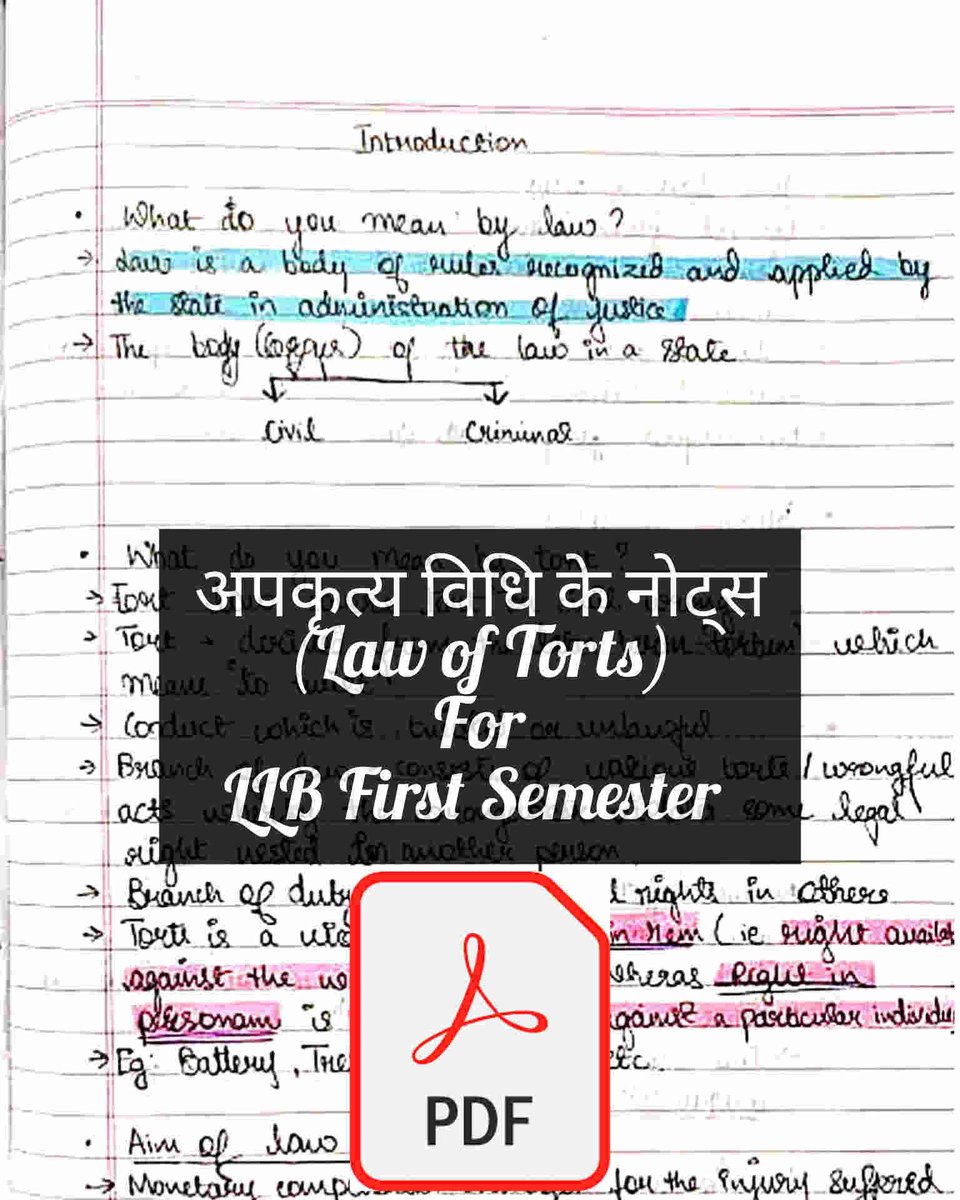Law of Torts, Motor Vehicle Act, Consumer Protection Act and other Important Notes PDF for LLB First Semester in Hindi and English. अपकृत्य विधि, मोटर व्हीकल एक्ट अन्य ला के नोट्स फ्री पीडीएफ यहां डाउनलोड करें
Torts Law Notes for LLB 1st Semester
Tort law is a crucial component of legal studies, particularly for LLB (Bachelor of Laws) students. It constitutes a vast and dynamic area of law that addresses civil wrongs, providing remedies for individuals who have suffered harm due to the wrongful conduct of others.
This article aims to provide LLB students with a comprehensive overview of tort law, covering its essential principles, types of torts, and the remedies available to victims.
अपकृत्य विधि क्या है | Understanding Tort Law
At its core, tort law is concerned with civil wrongs that cause harm or loss to individuals or their property. Unlike criminal law, which deals with offenses against the state, tort law focuses on the rights and duties individuals owe to one another. The primary objective of tort law is to compensate the injured party rather than to punish the wrongdoer.
अपकृत्य विधि के प्रमुख सिद्धांत | Key Principles of Tort Law
Duty of Care
Central to tort law is the concept of duty of care. It establishes that individuals must exercise a reasonable standard of care to avoid causing harm to others. The breach of this duty can give rise to legal liability.
Breach of Duty
To establish a tort, there must be a breach of the duty of care. This breach occurs when an individual fails to meet the standard of care expected in a given situation.
Causation
There must be a causal link between the breach of duty and the harm suffered by the plaintiff. The harm should be a direct result of the defendant's actions or omissions.
Damages
To succeed in a tort claim, the plaintiff must demonstrate that they have suffered actual harm, whether physical, emotional, or financial. Damages serve as a basis for the compensation awarded.
भारतीय टॉर्ट्स कानून के महत्वपूर्ण टोपिक्स
Important Topics of Indian Law of Torts
The Indian law of torts is primarily governed by judicial decisions and precedents, as there is no codified law specifically titled "Indian Law of Torts."
However, the principles of tort law in India have evolved through various judgments of the courts. Here are some important topics and principles within the Indian law of torts that are commonly studied and discussed.
Negligence
- The concept of duty of care in negligence.
- Standard of care and reasonable foreseeability.
- Causation and remoteness of damage.
- Defenses in negligence cases.
Nuisance
- Private nuisance and public nuisance.
- Balancing competing interests in nuisance cases.
- Remedies for nuisance.
Defamation
- Elements of defamation – false statement, publication, and harm to reputation.
- Defenses in defamation cases, including truth, privilege, and fair comment.
- Libel and slander distinctions.
Trespass
- Trespass to person, land, and goods.
- Defenses against trespass claims.
- Remedies available to victims of trespass.
Strict Liability
- Liability without fault in certain situations.
- Absolute and strict liability in hazardous activities.
- The rule in Rylands v. Fletcher.
False Imprisonment
- Elements of false imprisonment.
- Defenses and exceptions in false imprisonment cases.
- Damages available to the victim.
Negligent Misrepresentation
- Liability for making false statements negligently.
- Elements and defenses in cases of negligent misrepresentation.
Torts against Personality
- Invasion of privacy.
- Misuse of private information.
- Right to publicity.
Vicarious Liability
- The liability of employers for the actions of their employees.
- Tests for determining the scope of employment.
Damages
- Compensatory and punitive damages.
- Measure of damages in different torts.
Doctrine of Sovereign Immunity
- Limitations on suing the government for tortious acts.
- Exceptions to sovereign immunity.
Consumer Protection in Torts
- Product liability.
- Negligence in the provision of services.
Motor Vehicle Accidents
- Liability in motor vehicle accident cases.
- No-fault liability and compensation.
Constitutional Torts
- Violations of fundamental rights leading to tortious liability.
- Cases involving state action causing harm.
अपकृत्य में उपचार | Remedies in Tort Law
Compensatory Damages
The most common remedy in tort law, compensatory damages aim to restore the injured party to the position they were in before the wrongful act occurred.
Punitive Damages
In cases of egregious misconduct, punitive damages may be awarded to punish the wrongdoer and deter others from similar behavior.
Injunctions
Courts may issue injunctions to prevent a party from engaging in certain conduct or to compel specific actions.
एलएलबी छात्रों के लिए टॉर्ट्स के कानून के बारे में
About Law of Torts for LLB Students
Tort law forms a foundational aspect of legal education for LLB students, offering a comprehensive framework for addressing civil wrongs and providing remedies for those who suffer harm.
A thorough understanding of the principles, types of torts, and available remedies is essential for aspiring lawyers to navigate the complexities of this dynamic field and contribute to the pursuit of justice in civil matters.
FAQ of Indian Law of Torts
What is tort law?
Tort law is a branch of civil law that deals with civil wrongs, providing remedies for individuals who have suffered harm or losses due to the wrongful acts of others.
What is the difference between a tort and a crime?
A tort is a civil wrong that causes harm to an individual or their property, leading to a legal liability for the wrongdoer. In contrast, a crime is a wrongful act against the state and is prosecuted by the government.
What is the principle of "duty of care" in tort law?
Duty of care is a legal obligation to act with reasonable care to avoid causing harm to others. It is a fundamental concept in negligence cases, where a breach of this duty can lead to liability.
What are the key elements of negligence?
The key elements of negligence include duty of care, breach of duty, causation, and damages. To establish negligence, it must be shown that the defendant owed a duty of care, breached that duty, and caused harm to the plaintiff.



0 Comments
Thanks for comment!